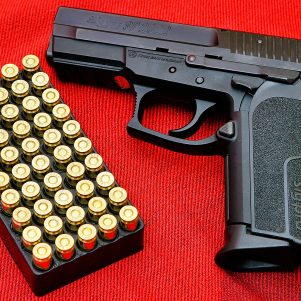Massachusetts High Court Narrows Warrantless Searches
By NBP Staff | March 17, 2019, 9:46 EDT
 (Courtesy of Wikimedia)
(Courtesy of Wikimedia) Being seen going into residential building with a gun doesn’t provide police with enough justification to search an apartment without a warrant, the Massachusetts Supreme Judicial Court has ruled.
“Of course, carrying a firearm is not itself a crime in the Commonwealth,” the court said in a 4-0 opinion released Friday.
The case stems from an incident in Lawrence in March 2014. A 911 caller told a police dispatcher she saw two “Spanish guys … with a gun … going up to the building,” a four-unit apartment building on Royal Street. Police were concerned about an outbreak of home invasions in the city, and they thought this might be one of them.
The caller told police she heard one of the man racking a gun as he went in, which caused the court pause – “loading a handgun in public prior to entering a residential building does raise valid concerns about the possibility of imminent criminal conduct,” the court said.
Police showed up in force. They talked to residents of one of the apartments of the building, who said they didn’t know the people in the apartment downstairs. When a man who didn’t match the description of the men the 911 caller had given left a back entrance, police told him to freeze and show them his hands, but instead he went back into the building and locked the door behind him.
At that point police forcibly entered without a warrant one of the apartments, where they saw illegal drugs, a scale, and plastic bags in plain view. They found three men in the basement and arrested them.
At trial the men’s lawyers sought to suppress the evidence, saying police had no right to be in the apartment.
Ordinarily, cops need a warrant to enter a home without permission, but in case law exceptions occur when there is an emergency or they have probable cause that a crime is occurring. Once inside, cops can’t perform a search to try to find evidence of illegal activity without a warrant, but they can ordinarily act on evidence they see in plain view.
Prosecutors argued that police were justified because they had good reason to suspect a home invasion. But the court noted that the caller told a police officer by telephone that the men probably had a key to the building because they entered “easily” – leading to a reasonable conclusion that they lived there. In addition, police found no evidence of a home invasion when they entered the apartment building before they forcibly entered the apartment.
“The investigation of a crime, even a serious crime such as an armed home invasion, does not itself establish an exigency,” the court said, in an opinion written by Justice Frank Gaziano.
The court took the case in part to try to define more closely when police can and can’t enter a building in Massachusetts without a warrant.
The majority opinion cites Article 14 of the Massachusetts Constitution, which states:
Every subject has a right to be secure from all unreasonable searches, and seizures, of his person, his houses, his papers, and all his possessions. All warrants, therefore, are contrary to this right, if the cause or foundation of them be not previously supported by oath or affirmation; and if the order in the warrant to a civil officer, to make search in suspected places, or to arrest one or more suspected persons, or to seize their property, be not accompanied with a special designation of the persons or objects of search, arrest, or seizure: and no warrant ought to be issued but in cases, and with the formalities prescribed by the laws.
The court decided the 911 caller’s information wasn’t enough for police to do what they did.
“We acknowledge that this case presents a difficult question of probable cause, and that officers are at times required to make split-second decisions to avert violence. The racking of a firearm in public prior to entering a residential building isindeed a troubling suggestion of possible violent activity,” the court said. “In the circumstances here, however, given the absence of independent corroborating evidence, the reliability of the 911 caller’s testimony was insufficient to establish probable cause under art. 14.”
Justice David Lowy concurred with the decision tossing the evidence because he said the police search of the apartment was not justified. But unlike the other three justices, he found that police had probable cause to enter the apartment, because he found the 911 caller a reliable informant (both because she knew police could identify her and because he used a technical term – “racking” – to describe loading a gun) and because the man retreated into the building when ordered by police to freeze and show them his hands.
The case is called Commonwealth vs. Jose L. Arias. It was decided Friday, March 15.









